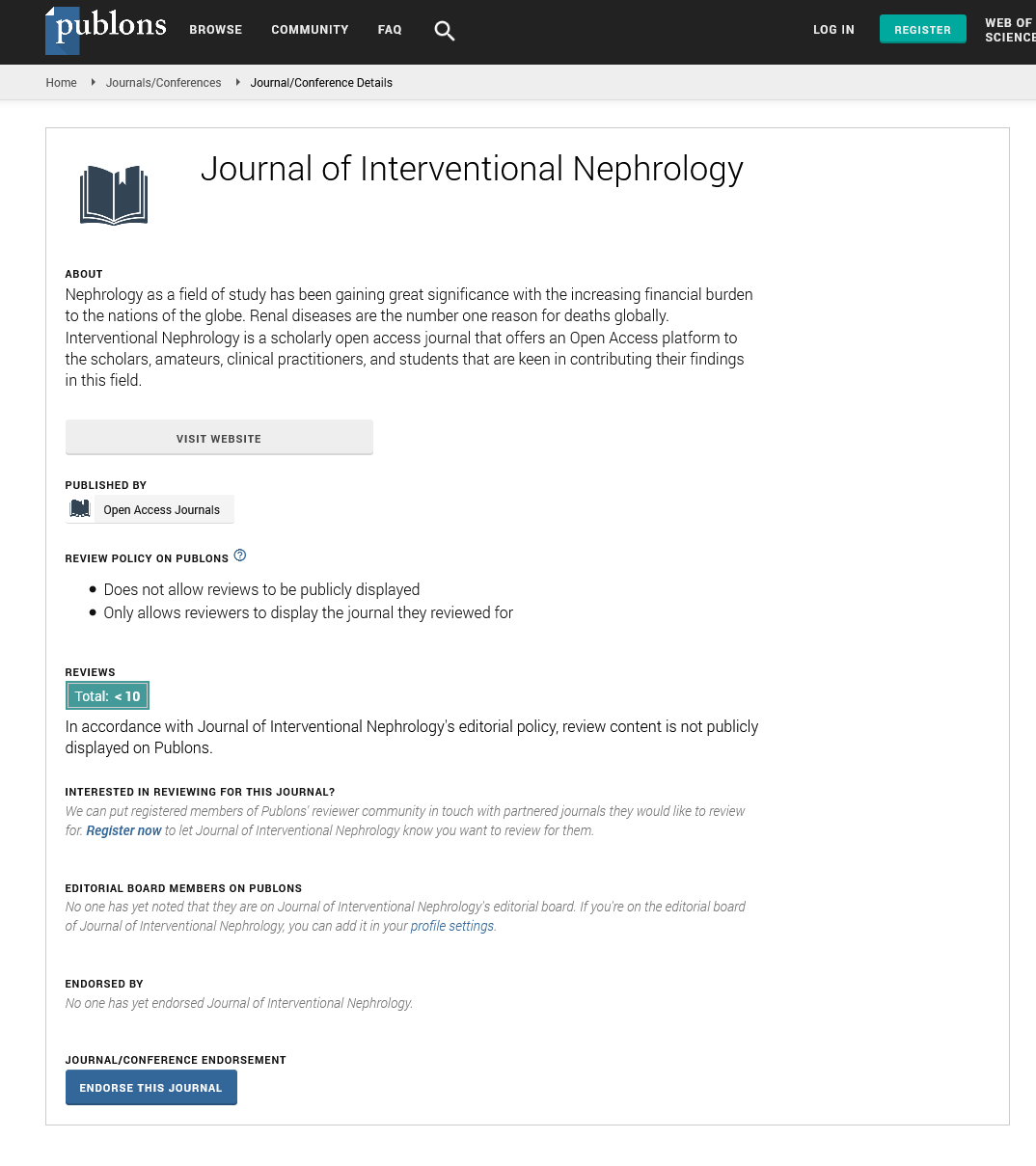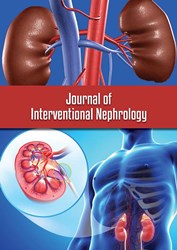Commentary - Journal of Interventional Nephrology (2023) Volume 6, Issue 5
Interventional Nephrology Preparing for Youthful Nephrologists
- Corresponding Author:
- Nunez-Benjumea Francisco
Department of Nephrology, Bhabha University, Afghanistan
E-mail: kikonune@salumedia.com
Received: 04-Sep-2023, Manuscript No. OAIN-23-118358; Editor assigned: 06-Sep-2023, PreQC No. OAIN-23-118358 (PQ); Reviewed: 20-Sep-2023, QC No. OAIN-23-118358; Revised: 27-Sep-2023, Manuscript No. OAIN-23-118358 (R); Published: 06-Oct-2023, DOI: 10.47532/oain.2023.6(5).183-184
Description
The interest for interventional nephrology preparing has been consistently filling in lower, lower-center, and upper-center pay nations, where the quantity of interventionalists is exceptionally restricted, and patients frequently miss dialysis treatment due to vascular access issues. Interventional nephrology preparing for youthful nephrologists in low-or center pay nations is seldom accessible. ISN offers subsidizing for preparing in ISN-perceived interventional nephrology preparing focuses.
ISN interventional nephrology researchers will be prepared to give better nature of care to dialysis patients and to keep on preparing other medical services experts inside their area. Toward the finish of their preparation, Researchers might get further help and direction through the ISN instructive envoys program to guarantee the fruitful foundation of best practices in the nearby setting.
Intercessions have forever been important for each nephrologist’s everyday practice. Nephrologists were regularly making vascular gets to and were small specialists doing Arterio-Venous Shunts. They were even called for assist by others in their mediations to help cardiologists with their speed creator additions and anaesthesiologists with jugular catheterisations. The significance of interventional nephrology in a non-industrial nation was very much appreciated as soon as 1989, when nephrologists were making AV shunts and were changing them over completely to AV fistulas. Till as of late calling interventional nephrology another entity was fairly improper.
Sadly, large numbers of these mediations have gotten derailed expressions for some nephrologists now. Aneasthesiologists and intensivists embed vascular catheters, sonologists do renal biopsies, vascular specialists make fistulas and urologists place PD catheters. At the point when cardiologists do their reverberations, nephrologists hang tight for sonologists; when gastroenterologists do their endoscopies, cystoscopy is prohibited for nephrologists. These days nephrologists call ophthalmologists to preclude diabetic retinopathy, pulmonologists to tap pleural emanations and diabetologists to control blood sugars. At the point when nephrologists will trust that the cardiologists will analyze and treat renal conduit stenosis, it is to be sure about time we take serious note of interventional nephrology.
The main impetus to take up intercessions contrasts from one focus to another, contingent upon the geological area, accessible infra-structure, number of nephrologists and their responsibility. With more nephrologists dropping and great number of them able to go to more modest towns and focuses, the requirement for interventional nephrology is being understood even more at this point.
Being responsible for arranging and planning renal substitution treatment for his patients, with his exceptional clinical point of view and better comprehension of the necessities of the circumstance, the nephrologist is obviously appropriate for performing vascular access related strategies himself. This approach will limit delays, decline hospitalizations and reduction the utilization of transitory catheters, subsequently working on clinical consideration, diminishing expenses and expanding patient comfort.
Be that as it may, yet, nephrologists keep on calling various experts for various systems. At times different experts are required a similar system, albeit not a single one of them are explicitly prepared for these intercessions. Arteriovenous Fistula (AVF) is being made by vascular specialists, heart specialists, urologists, plastic specialists and general specialists in various focuses.
Office for renal consideration in non-industrial nations is scanty and is focused overwhelmingly in huge urban areas. Most of the weak populace, living in distant towns, has no admittance to treatment in any event, for reversible renal issues, abandon for end stage renal disappointments. A renal clinical center calls for collaboration by nephrologist, urologist, radiologist, sonologist, and vascular specialist other than dialysis nurture, dietician, social laborer from there, the sky is the limit. In emerging nations, other than financial issues, absence of prepared staff is a restricting variable for impending new focuses. This prevents youthful nephrologists from going to more modest towns and accordingly causes gross maldistribution of renal consideration office.
A review embraced to check whether advancement of interventional nephrology can improve conveyance of renal consideration in emerging nations, showed that:
• Nephrologist-populace proportion is low in
India and the nephrologists are packed in
enormous urban communities.
• Renal consideration conveyance is better in
regions with interventional nephrologist,
regardless of less nephrologists.
• Advancing interventional nephrology
among nephrologists and students can
upgrade conveyance of renal consideration
conveyance to the rising number of
populaces with renal sickness in nonindustrial
nations.
Scope for mediations:
• Ultrasonogram/doppler studies.
• Vascular access.
• Femoral, throat, subclavian.
• Permcaths in different areas.
• A V Fistulas.
• A V Unions.
• Salvaging bombing fistulas with
angioplasties.
• CAPD catheter additions.
• Percutaneous.
• Endoscopic surgical.
• Renal biopsy.
• Renal angiograms/angioplasties and other
cathlab systems.
• Depleting lymphoceles.


